In the News
APF Canada's media responses to the latest issues and events in Asia
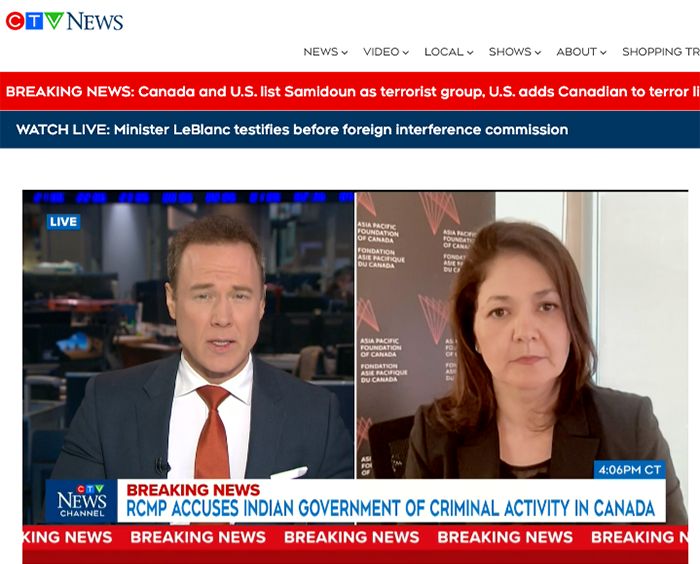
CTV News
Canada-India relations in ‘uncharted waters’
CTV News, October 14, 2024
Featuring: Vina Nadjibulla, Vice-President Research & Strategy, APF Canada
Excerpt: "What we essentially just heard the prime minister of Canada say is that Indian and diplomatic officials here in Canada have been involved in criminal activities and violation[s] of Canadian state sovereignty... we are in uncharted waters ... for this to happen with a friendly country is unprecedented and it will have implications on every dimension of Canada's engagement with India but it will also have implications for our broader engagement with the region."

CBC News
Canada expels 6 Indian diplomats, RCMP alleges 'serious criminal activity'
CBC News, October 14, 2024
Featuring: Vina Nadjibulla, Vice-President Research & Strategy, APF Canada
Excerpt: "...There is an ongoing threat to Canadians here in Canada and that's why [the RCMP] are acting [now]...There's a national security element as well where we're looking at a wide campaign that has been going on for years of transnational aggression here in Canada.
...There will be growing demand on India for accountability... This involves Canada but it also involves our diplomatic partners, notably the United States, which also have issues [with India] along those lines
... No matter what the concerns are on the part of India [regarding the Pro-Khalistan movement in Canada], transitional killings and homicides in a friendly state is absolutely unacceptable."
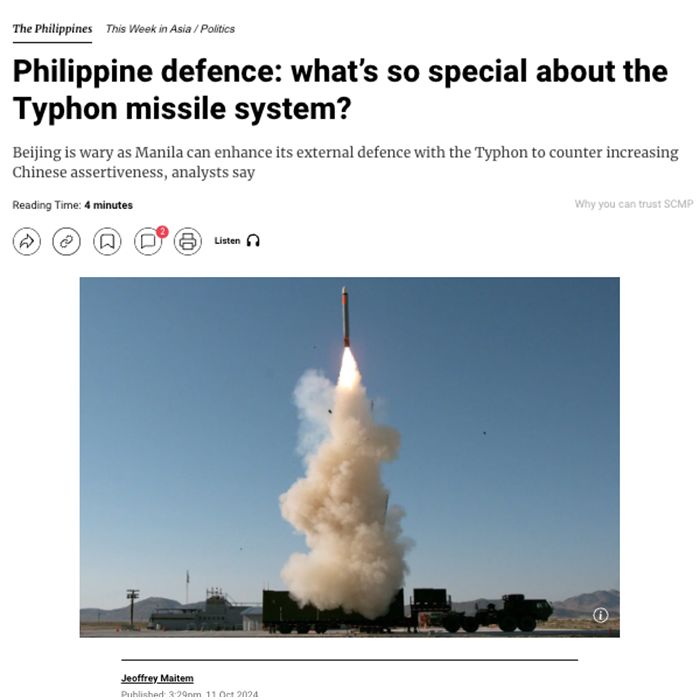
South China Morning Post
Philippine defence: what’s so special about the Typhon missile system?
South China Morning Post, October 11, 2024
Featuring: Vina Nadjibulla, Vice-President Research & Strategy, APF Canada
Excerpt: Vina Nadjibulla, vice-president of research and strategy at the Asia-Pacific Foundation of Canada, said the decision to keep the Typhon was likely part of a broader US strategy to enhance its presence in the Indo-Pacific amid growing tensions with China.
“It signals a strengthened US-Philippine defence relationship and could serve as a deterrent against Chinese actions in contested areas like the South China Sea and Taiwan Strait,” Nadjibulla told This Week in Asia.
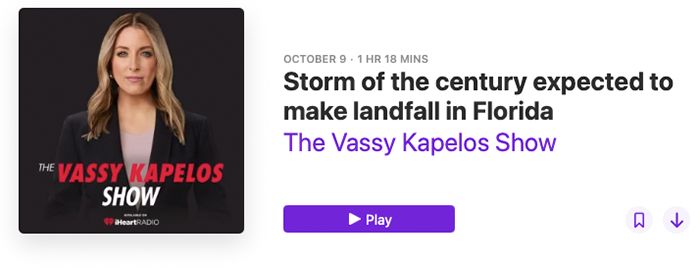
Vassy Kapelos Show
A podcast discussion of the 44th and 45th ASEAN Summits
The Vassey Kapelos Show, October 10, 2024
Featuring: Vina Nadjibulla, Vice-President, Research & Strategy, APF Canada
Topic: Vina Nadjibulla, Vice-President, Research & Strategy, Asia Pacific Foundation of Canada joins Vassy to discuss the 44th and 45th ASEAN Summits.
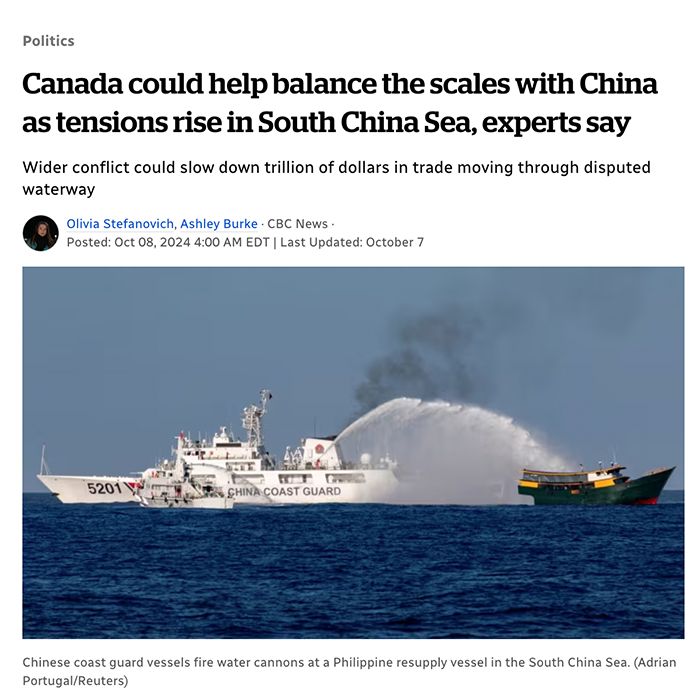
CBC News
Canada could help balance the scales with China as tensions rise in South China Sea, experts say
CBC News, October 8, 2024
Featuring: Vina Nadjibulla, Vice-President Research & Strategy, APF Canada, and Stephen Nagy, APF Canada Senior Fellow and Professor, International Christian University, Tokyo.
Excerpt (Nagy): "None of the countries in the region want to escalate the security tensions within the region, but they do want to have the capabilities to be able to deal with these challenges bilaterally with China."
"The South China Sea is really a cauldron of instability . . . What we think is this could cascade into a kinetic conflict. And what that means is a conflict between militaries within the South China Sea. "
Excerpt (Nadjibulla): Vina Nadjibulla . . . said Canada and the U.S. are among the countries that have been calling China out over its "aggressive manoeuvres" in the South China Sea.
She said those "unprofessional" tactics — widely seen as acts of intimidation and coercion — have led to "constant near-misses" between ships.
"Essentially, [the Chinese are] trying to dissuade other economies from using ... the resources available in their own economic zone," she said.
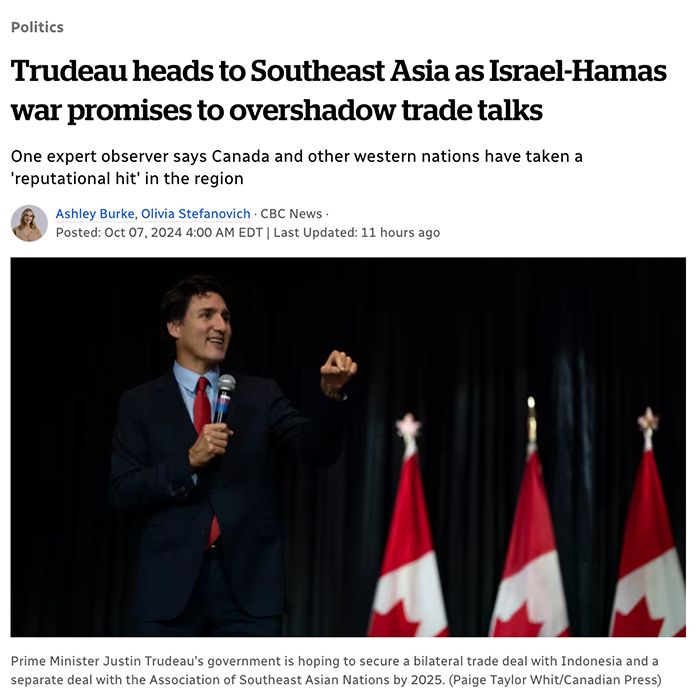
CBC News
Trudeau heads to Southeast Asia as Israel-Hamas war promises to overshadow trade talks
CBC News, October 7, 2024
Featuring: Vina Nadjibulla, Vice-President Research & Strategy, APF Canada
Excerpt: "What's important is to remind everyone that we care about human rights, we care about resolving conflicts everywhere in the world, not just in certain locations, in order to be able to counter this charge of hypocrisy," Nadjibulla said.
Claims that the nations of the West — and the U.S. in particular — are taking a hypocritical approach to the Israel-Hamas war are "overblown," she said, and are being driven by Russian and Chinese disinformation campaigns.
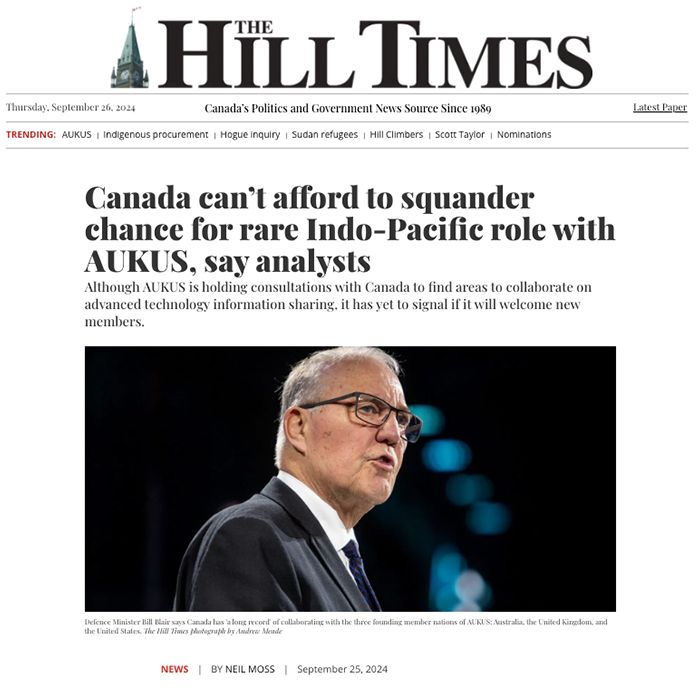
Hill Times
Canada can’t afford to squander chance for rare Indo-Pacific role with AUKUS, say analysts
Hill Times, September 25, 2024
Featuring: Vina Nadjibulla, Vice-President Research & Strategy, APF Canada
Extract: “It’s good to leverage our excellence in quantum, and AI research, and cyber defence capabilities, but we also need to put new resources and invest in the necessary platforms and modernize platforms, including through NORAD, but also our engagement in the Indo-Pacific,” [Vina Nadjibulla,Vice-President Research & Strategy at the Asia Pacific Foundation of Canada] said.
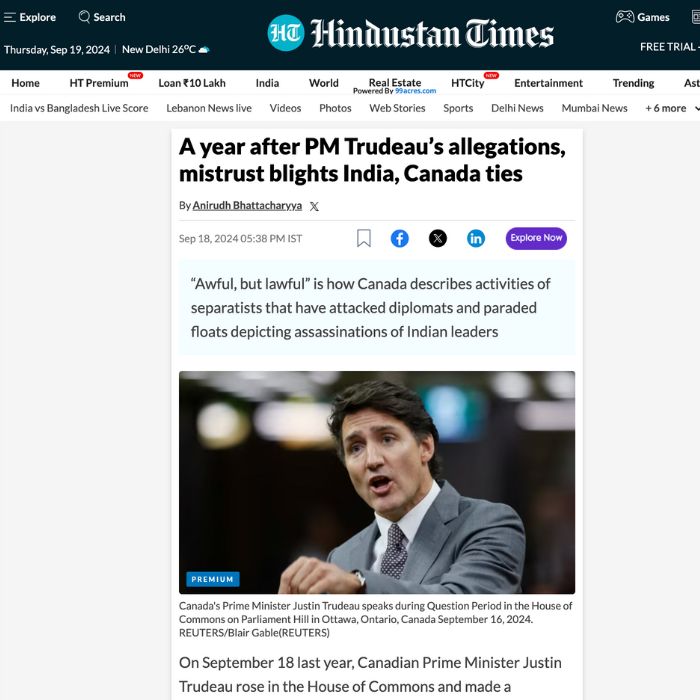
A year after PM Trudeau’s allegations, mistrust blights India, Canada ties
Hindustan Times, September 18, 2024
Featuring: Vina Nadjibulla, Vice President Research & Strategy, APF Canada
Extract: Things should improve, said Vina Nadjibulla, vice president, research and strategy, at the Vancouver-based Asia-Pacific Foundation of Canada. She said, “There's no two ways there was a diplomatic crisis and we're still dealing with the aftereffects. But, at the same time, we can see that other parts of their relationships are resilient.” Trade and investment continue, and provinces like Saskatchewan and Ontario have been amenable to forging stronger ties. “I think we'll have to see on balance the long-term potential of the relationship is very much there and it's strong,” she said.
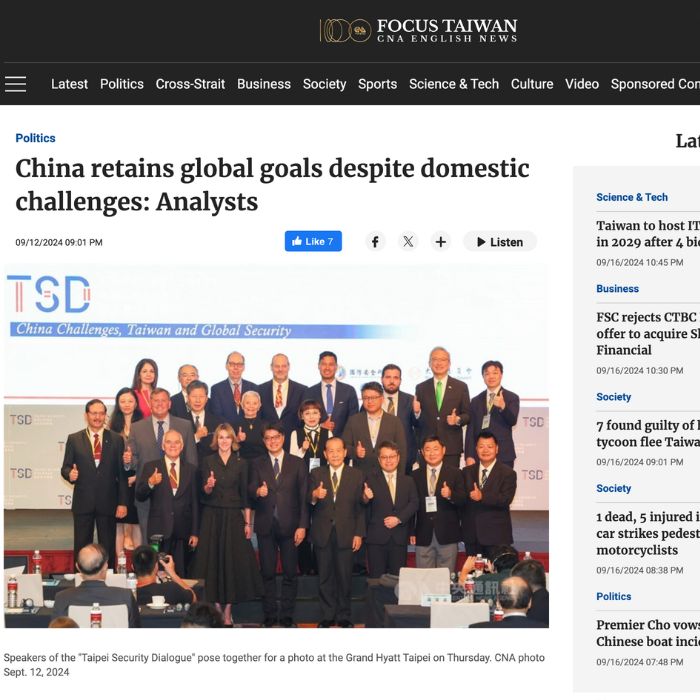
China retains global goals despite domestic challenges: Analysts
Focus Taiwan, September 12, 2024
Featuring: Vina Nadjibulla, Vice President Research & Strategy, APF Canada
Extract: Vina Nadjibulla, vice president of the research and strategy arm of the Asia Pacific Foundation of Canada, observed that Beijing's one key response to what it sees as the U.S. seeking to "suppress" and "contain" it was to build its own international groupings. She rebutted comments on China becoming increasingly isolated, arguing that the country had been trying to "fortify itself from the West" and "fully integrate itself" with the non-Western world.
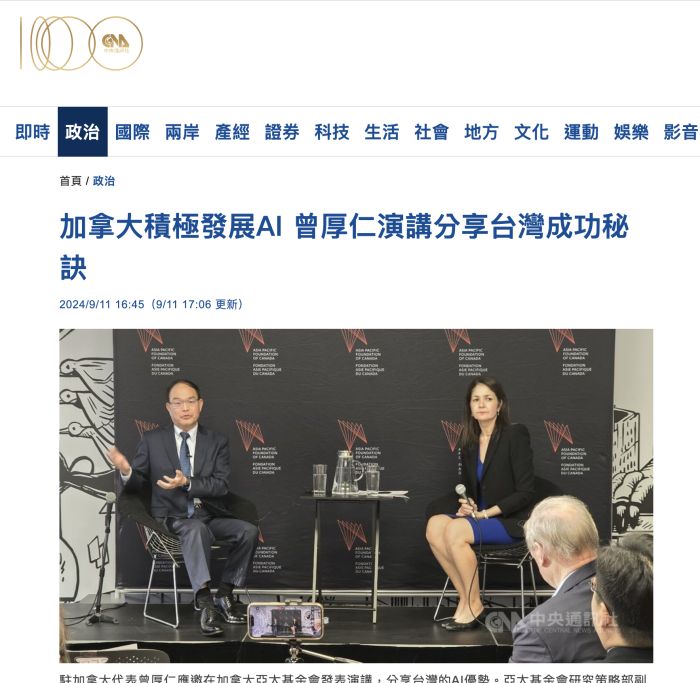
Canada is actively developing AI. Tsang Youren gave a speech and shared the secrets of Taiwan’s success.
Central News Agency, September 11, 2024
Featuring: Vina Nadjibulla, Vice President Research & Strategy, APF Canada
Extract: Representative to Canada Youren Tsang was invited by the Asia Pacific Foundation of Canada to deliver a speech titled "Artificial Intelligence, Automotive Chip Technology and Supply Chain Resilience - Huge Opportunities for Taiwan-Canada Cooperation" and met with Vina Nadjibulla, Vice President of the Research Strategy Department of the Asia Pacific Foundation. Their conversation attracted nearly a hundred people from the academic and business circles to listen.
The original article was published in Chinese (traditional).
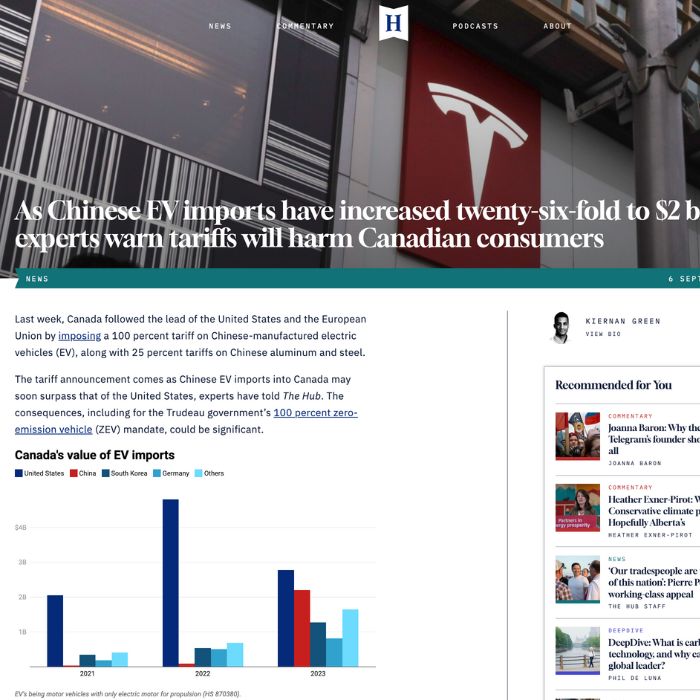
As Chinese EV imports have increased twenty-six-fold to $2 billion, experts warn tariffs will harm Canadian consumers
The Hub, September 6, 2024
Featuring : Vina Nadjibulla, Vice President Research & Strategy, APF Canada
Extract: In the short term, the impact of Canada’s tariffs on Chinese EVs is likely to be minimal, said Nadjibulla. In 2023, all EV imports from China were Tesla models manufactured in Tesla's Shanghai factory, she said. “To avoid these tariffs in the U.S. and Canada, Tesla will likely change its supply routes. Therefore, the immediate impact on Canadian consumers is limited.”

China hits Canada with anti-dumping canola probe after EV tariffs
Global News, September 4, 2024
Featuring: Jeff Nankivell, President & CEO, APF Canada
Extract: "This is now China saying, okay, you've accused us of this. Well, we're going to accuse you of doing that. This was not a surprise to anybody."

China claps back on Canada’s hefty EV, steel and aluminum tariffs
The Jas Johal Show (Global News), September 3, 2024
Featuring: Vina Nadjibulla, Vice-President Research & Strategy, APF Canada
Excerpt: "[China] is sending a message that they will retaliate, that they have their own measures, particularly against canola, which about $5 billion of exports was sent from Canada to China last year alone. China is essentially saying it also has options and that it will retaliate, that there will be a tit-for-tat if Canadian EV tariffs come into effect in October as announced."
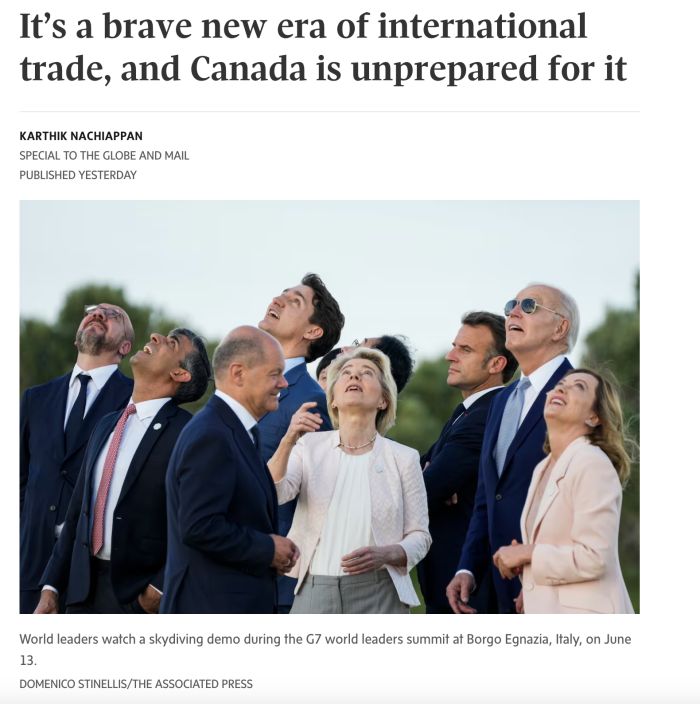
It’s a brave new era of international trade, and Canada is unprepared for it
The Globe and Mail, September 2, 2024
Featuring: Karthik Nachiappan, Senior Fellow (non-resident), APF Canada
Excerpt: "Canada must adapt for an intensely competitive global economic context. Trade is no longer just trade. It is about establishing and correcting the conditions that enable countries to exchange goods and services. It is about devising appropriate rules to regulate problems and using those measures and market power to generate compliance from others.
Our trade policy must reflect and advance the ambitions of its climate transition, security concerns and interests and technological strides. Anything less will not be fit for purpose."
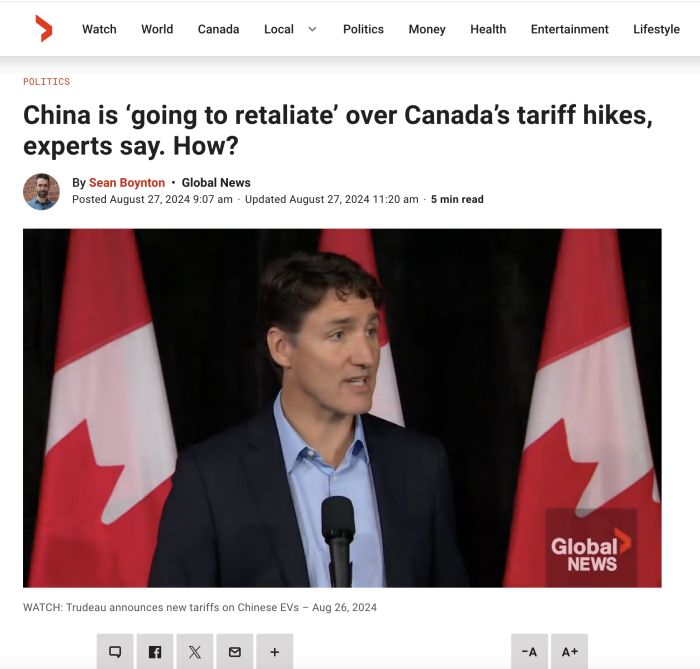
Global News
China is ‘Going to Retaliate’ Over Canada’s Tariff Hikes, Experts Say. How?
Global News, August 27, 2024
Featuring: Vina Nadjibulla, Vice-President Research & Strategy, APF Canada
Excerpt: China’s reaction, Nadjibulla suggested, may be in line with how it responded to the European Union when the bloc imposed additional tariffs on Chinese EV imports as high as 36.3 per cent.
“China could pick a sector and launch its own process to potentially then block some market access,” she said, pointing to agricultural exports as a potential target.
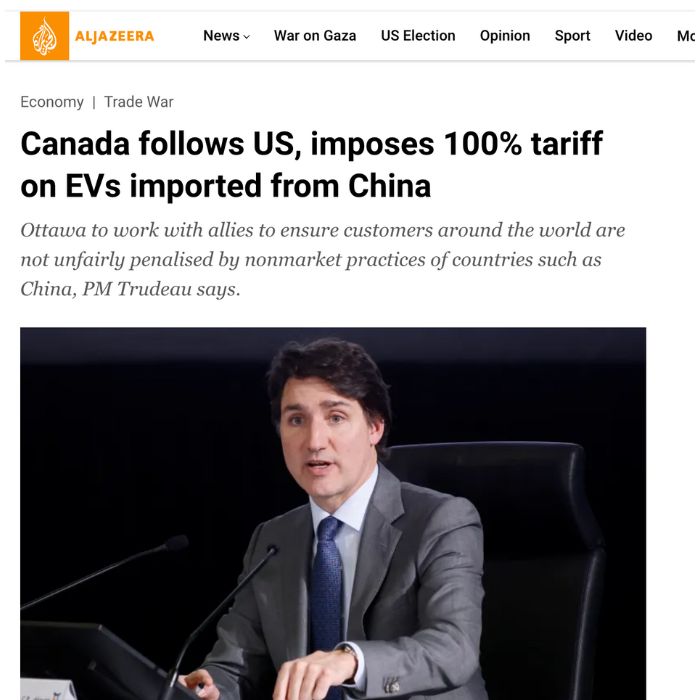
Al Jazeera
Canada Follows US, Imposes 100% Tariff on EVs Imported from China
Al Jazeera, August 26, 2024
Featuring: Vina Nadjibulla, Vice-President Research & Strategy, APF Canada
Excerpt: “The Canadian and US auto sectors are fully integrated, and it makes sense for Canada to be fully aligned and in lockstep with the US on these tariffs,” Vina Nadjibulla, vice president of research and strategy at the Asia Pacific Foundation of Canada, told Al Jazeera. “This is consistent with Canada’s economic and national security agenda. … The question mark right now is how China will react.”
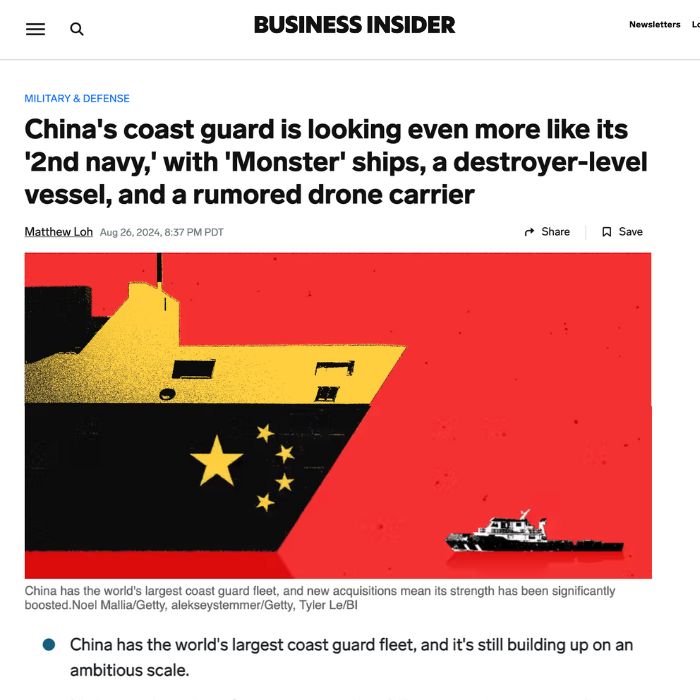
Philippine Coast Guard via Business Insider
China's Coast Guard is Looking Even More Like its '2nd Navy'
Business Insider, August 26, 2024
Featuring: Vina Nadjibulla, APF Canada Vice-President Research & Strategy
Excerpt: Western experts think the destroyer-esque ship being assembled in Shanghai is part of China's effort to stay ahead.
"China is upping the ante again by bringing in the most kind of modern, advanced form of a coast guard ship," said Vina Nadjibulla, vice president of research and strategy at the Asia Pacific Foundation of Canada. "We should see it more as a naval ship than a coast guard ship."
(Read a PDF version of this story here.)
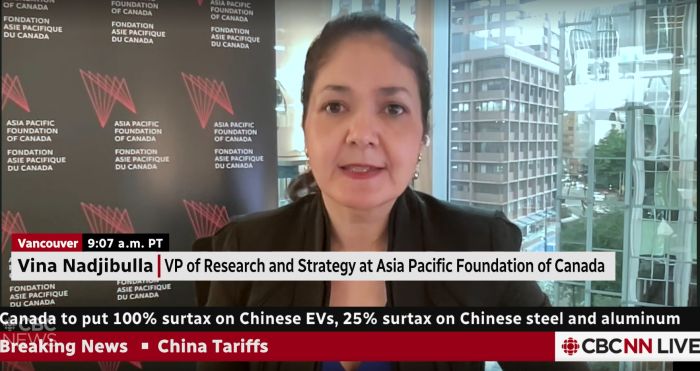
CBC News
CBC News Network's Natasha Fatah Speaks with Vina Nadjibulla on Canada's Tariffs on Chinese-made EVs
CBC News, August 26, 2024
Featuring: Vina Nadjibulla, APF Canada Vice-President Research & Strategy
Extract: "This was a much-anticipated and necessary move and we didn't have a choice, not necessarily because of the U.S., but because of the threat Chinese over-capacity and industrial subsidies present to our economic security as well as our economic resilience and national security."
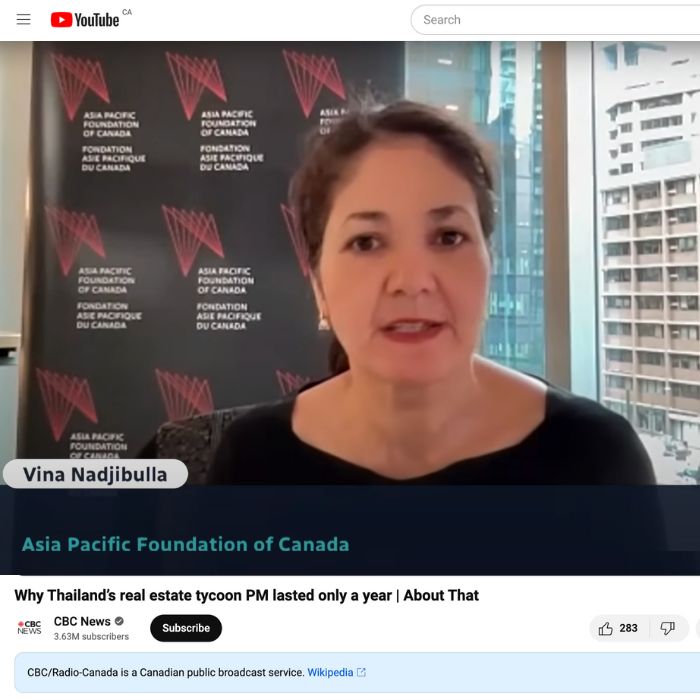
Why Thailand’s real estate tycoon PM lasted only a year
CBC News, August 16, 2024
Featuring: Vina Nadjibulla, APF Canada Vice-President Research & Strategy
Extract: "We're seeing these fifty, sixty million voters in Thailand keep electing progressive actors and certainly the vote for the Move Forward party was the latest iteration of that, but that will of the people gets interrupted either by military coups or by the intervention of the court."
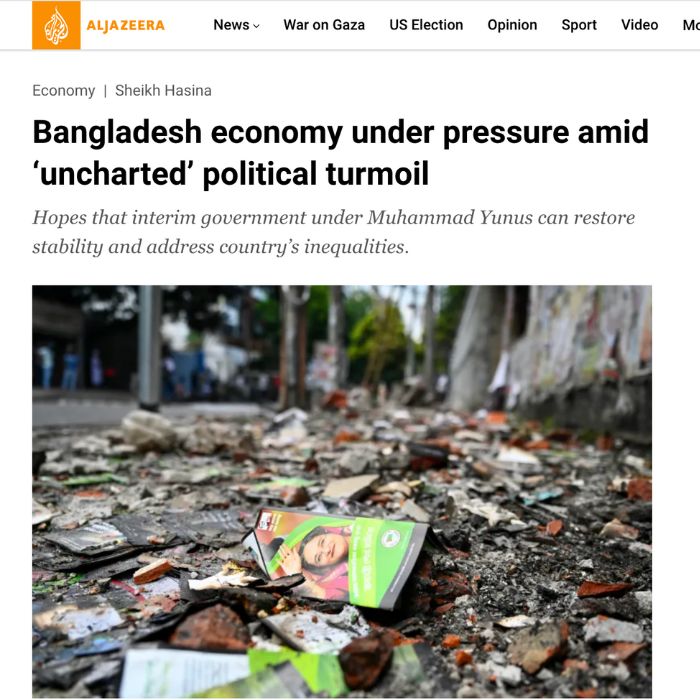
Bangladesh economy under pressure amid ‘uncharted’ political turmoil
Al Jazeera, August 8, 2024
Featuring: Vina Nadjibulla, APF Canada Vice-President Research & Strategy
Extract: "Those that were looking at Bangladesh as an attractive China+1 strategy … this political instability puts a question mark around it and makes it more urgent to restore law and order so that supply chains don’t get further impacted."
